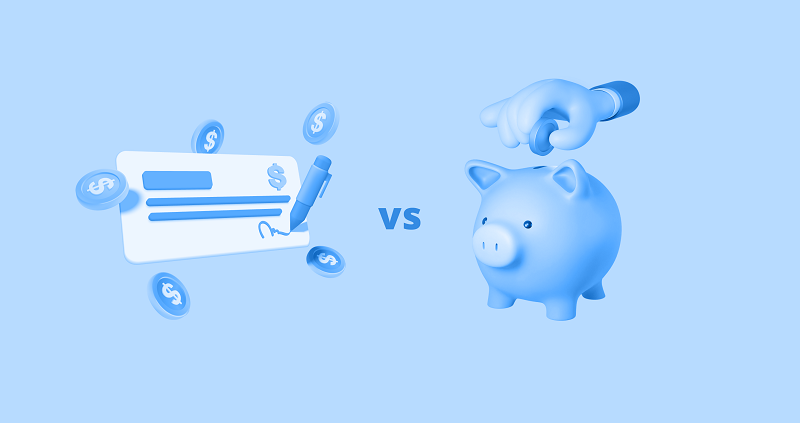Annuities vs. CDs: How do they compare?
Compare annuities and CDs to see how each can fit into your savings or retirement plan, weighing differences in purpose, risk, returns, and liquidity.
What are annuities: Annuities are long-term contracts with insurance companies designed to provide guaranteed income, typically for retirement, with options for tax-deferred growth.
What are certificates of deposit (CDs): CDs are short- to medium-term savings products from banks or credit unions, are considered low-risk, and guarantee fixed returns but with limited flexibility.
What is the best choice for me: The best choice depends on your financial goals. Annuities are generally used for retirement income planning, while CDs provide fixed returns over a set term for lower-risk, predictable growth.
Understanding annuities and CDs
Annuities and certificates of deposit (CDs) are both tools you can use to save for your future. However, understanding the difference between an annuity and a CD is important to help you make an informed decision when choosing what is best for you.
Definition and purpose of annuities
An annuity is a contract with an insurance company in which you pay a lump sum or series of premium payments and receive a regular stream of income in return. Annuities come in many forms, including variable, immediate, fixed, and fixed-indexed annuities. While some may accrue interest, they may have different terms, benefits, and risks, depending on what type you choose.
Essentially, the purpose of an annuity is to convert an amount of money into a guaranteed stream of regular payments (often used during retirement) so you don’t outlive your assets.
Definition and purpose of certificates of deposit (CDs)
A certificate of deposit (CD) is a type of deposit account offered by a bank or credit union that holds a fixed amount of money for a predetermined period of time at a fixed interest rate. In exchange for leaving your funds untouched, you can typically receive interest rates higher than those of traditional savings accounts, but withdrawing money before the CD reaches maturity results in a penalty.
Interest earned on CDs is generally taxable in the year it’s credited, even if you don’t withdraw it, unless the CD is held in a tax-advantaged account such as an IRA.
The main purpose of a CD is to provide a predictable way to grow your money with competitive interest rates.
How each product fits into a financial plan
Both annuities and CDs can be incorporated in your financial goal planning. Here are some reasons for why you might use them.
Annuities can be useful for:
Long-term goals and lifetime income: Annuities are generally used for long-term growth rather than short-term needs. They can be structured to provide you with regular income for the rest of your life and can be used in a retirement income strategy.
Portfolio diversification: Annuities can help you diversify your portfolio by adding another asset class.
Tax-deferred growth: Some annuities provide a unique tax benefit, as they allow your money to grow tax-deferred. This means you won’t owe taxes on earnings until they are withdrawn, at which point they will be taxed as ordinary income, unlike long-term capital gains on stocks or mutual funds.
CDs can be used for:
Short- to medium-term savings goals: CDs can be useful for short- to medium-term goals where you won’t need immediate access to your funds (e.g., saving for a down payment on a house) where you can commit to not touching your funds for a fixed period of time.
Portfolio diversification for conservative investors: CDs allow you to diversify your portfolio and help spread risk. They are often used by those who prioritize preserving capital over chasing high returns, allowing you to grow your money with lower risk.
Retirement income supplementation: CDs can be a helpful way to supplement your retirement savings, and options like IRA CDs offer the same tax benefits as traditional or Roth IRAs.
What are the key differences between annuities and CDs?
Understanding what the difference between an annuity and a CD is can help you make a more informed decision when choosing which one works best for you.
Here is how annuities vs. CDs compare:
Feature | Annuities | Certificates of deposit (CDs) |
Purpose | Designed for long-term retirement income | Short- to medium-term savings vehicle |
Issuer | Insurance companies | Banks or credit unions |
Risk level | May carry investment risk (varies by type: fixed, variable, indexed) | Low risk (issuing banks or credit unions often offer FDIC/NCUA insurance) |
Returns | Can offer fixed, variable, or indexed returns; potential for higher returns but more complexity | Fixed interest rate locked in for the term |
Liquidity | Limited; early withdrawals often trigger surrender charges | Limited; early withdrawals usually incur penalties |
Insurance protection | Backed by the issuing insurance company’s financial strength. Limited protection may be available through your state’s guaranty association, typically capped at $100,000–$500,000 depending on state law. | Typically FDIC/NCUA insured by issuing bank or credit union (up to $250,000 per depositor) |
Uses | Long-term retirement income planning | Short- to medium-term safe savings with guaranteed returns |
Pros and cons of annuities vs. CDs
Once you understand what each product is for, you might find yourself asking if annuities are better than CDs, which one you should choose, or if you might want to use both.
Here are some pros and cons of annuities vs. CDs to help you decide.
Benefits and drawbacks of annuities
Pros
Guaranteed income (often for life).
Tax-deferred growth.
Flexible options (fixed, variable, indexed).
Possible death benefits.
Protection from market downturns (fixed/indexed).
Cons
High fees (especially variable annuities).
Limited liquidity with surrender charges.
Complex contracts.
Returns may lag inflation.
Withdrawals are taxed as ordinary income.
Early withdrawals before age 59½ may also face a 10% IRS penalty on earnings in addition to surrender charges.
Benefits and drawbacks of CDs
Pros
Low-risk when FDIC/NCUA-insured (up to limits).
Guaranteed fixed returns.
Simple, relatively easy to understand.
Flexible term lengths.
Commonly used for short- to medium-term goals.
Cons
Lower returns than some annuities.
Early withdrawal penalties typically equal several months’ worth of interest, depending on term length.
Interest may not keep up with inflation.
Limited liquidity (money is locked in unless you choose a no-penalty CD).
Fixed rates mean no benefit if market rates rise during your term.
Considerations for choosing between annuities and CDs
Before determining whether a CD vs. annuity is right for you, or if you can benefit from both, you might want to assess your financial goals, risk tolerance, investment horizon, and what you want to achieve with these products.
Understanding the tax implications for both products can also help you decide what aligns more closely with your needs. For example, if you are looking for long-term tax-deferred growth for retirement, you might consider an annuity or even an IRA or Roth IRA CD. However, if you already have retirement funds elsewhere and want to diversify your portfolio and focus on stable growth, a CD might be a more viable option.
While one product is not necessarily better than the other one, the best choice will be the one that aligns most closely with your financial goals.
Final thoughts: Making the right choice
Understanding the pros and cons of CDs vs. annuities is crucial to help you make the best decision. A financial advisor can further assist you in determining which product would be the best fit for you.
If you’re ready to get started with a CD or want to explore more flexible savings options, Raisin is here to help. The Raisin marketplace gives you access to a variety of high-yield savings products with competitive interest rates to help you grow your savings. Explore account options, compare rates, and sign up today to start maximizing your savings potential!
The above article is intended to provide generalized financial information designed to educate a broad segment of the public; it does not give personalized tax, investment, legal, or other business and professional advice. Before taking any action, you should always seek the assistance of a professional who knows your particular situation for advice on taxes, your investments, the law, or any other business and professional matters that affect you and/or your business.


